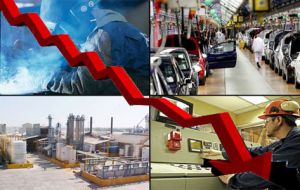MercoPress. South Atlantic News Agency
Argentina’s trade surplus surges 139% in May but imports plunge 49%
 Fiscal surplus in May, usually a good revenue month, dropped 85% over a year ago
Fiscal surplus in May, usually a good revenue month, dropped 85% over a year ago Argentina's May trade surplus soared 139% from a year ago to 2.48 billion US dollars because of a sharp drop in imports as the economy slows, the government said on Friday.
Exports fell 18% in May from a year earlier to 5.14 billion, while imports sank 49% to 2.66 billion US dollars. The slump in exports was caused largely by lower prices for Argentine shipments abroad of grains and oilseeds. Export prices fell 13% while the volume increased 6%.
Argentina is one of the world's leading suppliers of soy, corn and wheat.
Imports plunged 39%in volume and 16% in value, the INDEC statistics agency said in a statement. Imports have been falling in recent months as Argentina's six-year economic boom cools, linked to the global slowdown.
Purchases of foreign-made intermediate and capital goods as well as fuel all shrank in May, INDEC said. The accumulated trade surplus in the first five months of 2009 was 8.33 billion US dollars up 63% from 5.12 billion in the same period of 2008.
In related news the Treasury announced a fiscal surplus of 915 million Argentine pesos, equivalent to 243 million US dollars in May, which is a drop of 85% from the 6.03 billion-peso fiscal surplus reported in May 2008.
“This number comes on the back of a policy of sustaining production and employment” said Treasury Secretary Juan Carlos Pezoa. “There is a heavy investment in public works and social spending.”
The Argentine government has increased spending on stimulus programs to offset the slowing economy plus the fact that the country is holding key June 28 midterm elections. Moreover, as the economy slows, the Argentine provincial governments are racking up higher deficits, which require the federal government to disburse more money.
Tax revenues came in at 27.3 billion Argentine pesos in May, a traditionally strong revenue month, up 12.5% from the year before. That figure, however, is distorted by inflation, which many analysts put at around 15% a year, well ahead of the discredited official number of 5.5% in May.
Actually future inflation expectations were little changed in June, according to a closely watched survey of consumers. Torcuato Di Tella University said Friday that the average projection for inflation over the next 12 months was 31.5% in June, up 1.6 points from 29.9% in May.
However, the median expectation for inflation was unchanged at 20%, highlighting the fact that Argentina appears to be dealing with two challenging economic problems: inflation and recession.
The survey's results underscore the continuing gap between the public's perception of inflation and the official inflation report offered by the national statistics agency Indec.
Indec recently reported a 0.3% month-on-month increase for its May consumer price index and a 5.5% gain on the year. However, economists say that real inflation is likely two to three times the official amount.




Top Comments
Disclaimer & comment rulesCommenting for this story is now closed.
If you have a Facebook account, become a fan and comment on our Facebook Page!